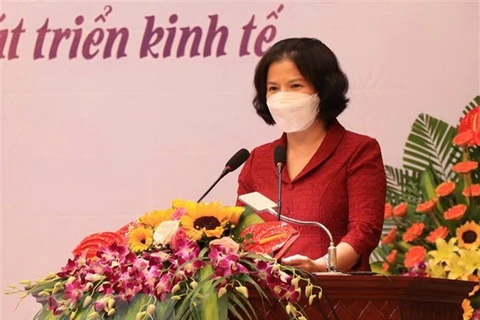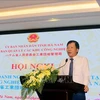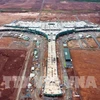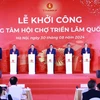Hanoi (VNA) - Informal charges continue to decline in most business-government interactions, according to the 2021 Provincial Competitiveness Index (PCI) released by the Vietnam Chamber of Commerce and Industry (VCCI) last week.
Businesses reporting that they had to pay for general informal charges dropped to 41.4 percent in 2021 from 44.9 percent in 2020, making a record low in 16 years of PCI surveys.
It is the most impressive figure, said chief of the VCCI’s Legal Department Dau Anh Tuan, adding that it reflects provinces’ strong efforts to accelerate reforms and create more favourable business environment for enterprises
The size of informal charges has also decreased considerably over time, the report said. The share of firms having to set aside more than 10 percent of their income to pay this cost slid to 4.1 percent, less than half the level recorded in 2016 (9.1 percent).
Between 2015 and 2016, seven out of every 10 firms said they had to pay informal charges, Tuan said, but the number gradually declined over years and stood at 41 percent in 2021.
He attributed the contraction to the anti-corruption operation led by the Party and State and efforts made by central to local administrations to foster public administration reforms.
Vietnam’s business climate will improve further and the informal charge index will continue falling in the future, he said.
The northern province of Quang Ninh once again topped the PCI with the highest score of 70.02 percent.
This is the 5th year in a row Quang Ninh has topped the charts. It is followed by the northern port city of Hai Phong with 70.61 points, and the Mekong Delta province of Dong Thap with 70.53 points.
Other cities and provinces in the top ten competitive localities include Da Nang, Binh Duong, Vinh Phuc, Bac Ninh, Thua Thien - Hue, Ba Ria - Vung Tau, and Hanoi.
Since 2005, the VCCI and the US Agency for International Development (USAID) have teamed up to produce the annual PCI report to measure the quality of economic management, the level of convenience and friendliness of the business environment, and administrative reform efforts made by provincial governments, thus promoting the development of the private sector./.
Businesses reporting that they had to pay for general informal charges dropped to 41.4 percent in 2021 from 44.9 percent in 2020, making a record low in 16 years of PCI surveys.
It is the most impressive figure, said chief of the VCCI’s Legal Department Dau Anh Tuan, adding that it reflects provinces’ strong efforts to accelerate reforms and create more favourable business environment for enterprises
The size of informal charges has also decreased considerably over time, the report said. The share of firms having to set aside more than 10 percent of their income to pay this cost slid to 4.1 percent, less than half the level recorded in 2016 (9.1 percent).
Between 2015 and 2016, seven out of every 10 firms said they had to pay informal charges, Tuan said, but the number gradually declined over years and stood at 41 percent in 2021.
He attributed the contraction to the anti-corruption operation led by the Party and State and efforts made by central to local administrations to foster public administration reforms.
Vietnam’s business climate will improve further and the informal charge index will continue falling in the future, he said.
The northern province of Quang Ninh once again topped the PCI with the highest score of 70.02 percent.
This is the 5th year in a row Quang Ninh has topped the charts. It is followed by the northern port city of Hai Phong with 70.61 points, and the Mekong Delta province of Dong Thap with 70.53 points.
Other cities and provinces in the top ten competitive localities include Da Nang, Binh Duong, Vinh Phuc, Bac Ninh, Thua Thien - Hue, Ba Ria - Vung Tau, and Hanoi.
Since 2005, the VCCI and the US Agency for International Development (USAID) have teamed up to produce the annual PCI report to measure the quality of economic management, the level of convenience and friendliness of the business environment, and administrative reform efforts made by provincial governments, thus promoting the development of the private sector./.
VNA























